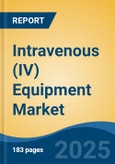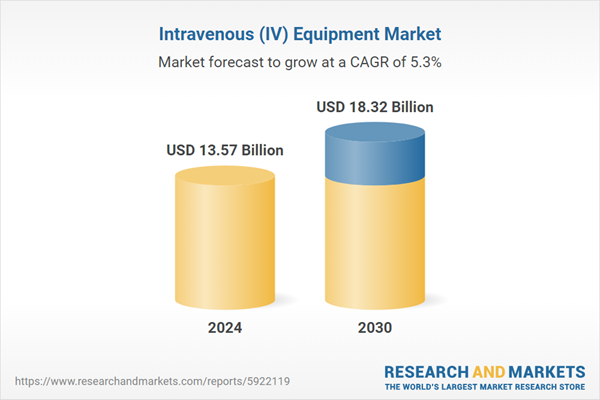Speak directly to the analyst to clarify any post sales queries you may have.
10% Free customizationThis report comes with 10% free customization, enabling you to add data that meets your specific business needs.
The market is characterized by a growing demand for innovative and advanced IV equipment, driven by the increasing prevalence of chronic diseases, the aging population, and the rising number of surgical procedures globally. For instance, according to data from the World Health Organization published in April 2021, chronic diseases are projected to cause 41 million deaths annually, accounting for 71% of all global deaths. Additionally, 77% of mortality in low- and middle-income countries is attributed to chronic diseases. As the number of cancer cases and other chronic conditions rise, the demand for various surgical procedures is expected to increase, driving market growth.
Key factors contributing to the growth of the Global Intravenous Equipment Market include the escalating incidence of diseases such as diabetes, cancer, and cardiovascular disorders, necessitating efficient and precise drug delivery mechanisms. As healthcare systems worldwide focus on improving patient outcomes and minimizing hospital stays, the demand for intravenous therapies has surged. The technological advancements in IV equipment, such as smart pumps, safety infusion systems, and wireless connectivity, have enhanced the accuracy and safety of drug administration, further fueling market expansion.
Key Market Drivers
Rising Prevalence of Chronic Diseases
The rising prevalence of chronic diseases is a pivotal factor driving the robust growth of the Global Intravenous (IV) Equipment Market. Chronic diseases, including diabetes, cardiovascular disorders, and cancer, have witnessed a significant surge in incidence worldwide. These conditions often necessitate long-term and intricate medical interventions, with intravenous therapy emerging as a crucial component of their management. The prevalence of chronic diseases is influenced by factors such as sedentary lifestyles, aging populations, and changes in dietary habits.As a result, there is an escalating demand for advanced and efficient intravenous solutions and equipment to facilitate the administration of medications and fluids required for the treatment of chronic conditions. For instance, according to the Alzheimer Society of Canada, over 500,000 Canadians were living with dementia as of January 2021, with the number expected to increase to 912,000 by 2030. Similarly, the Fondation de France reported that around 150,000 people in France were affected by Parkinson's disease in 2021, with the disease predominantly impacting the elderly. As the prevalence of chronic diseases rises, the demand for related healthcare solutions is expected to drive market growth in the coming years.
Key Market Challenges
Cost Constraints and Affordability
Cost constraints and affordability represent significant hurdles for the Global Intravenous (IV) Equipment Market, posing challenges to the widespread adoption of advanced intravenous technologies. The intricate and innovative nature of modern IV equipment, including infusion pumps, smart catheters, and monitoring systems, often comes with a hefty price tag. This presents a barrier for healthcare facilities, particularly in resource-limited regions, where financial constraints impede the seamless integration of state-of-the-art IV solutions.One of the primary obstacles is the high initial investment required for acquiring advanced IV equipment. Hospitals and healthcare providers, particularly those in developing countries, often operate on tight budgets, making it challenging to allocate substantial funds for the purchase of cutting-edge IV technologies. The upfront costs for these devices can strain financial resources, limiting the ability of healthcare facilities to invest in the latest innovations that could otherwise enhance patient care and safety.
Key Market Trends
Focus on Patient-Centric Healthcare
The Global Intravenous (IV) Equipment Market is experiencing a significant boost due to a pronounced shift towards patient-centric healthcare. This transformative trend places the patient at the center of the healthcare experience, influencing the design, functionality, and adoption of intravenous equipment. Recognizing the importance of patient comfort and adherence to treatment plans, manufacturers are increasingly prioritizing user-friendly features in the development of IV devices. Catheters, infusion pumps, and related accessories are being designed with a focus on minimizing discomfort, simplifying usage, and reducing the risk of complications.Key Market Players
- 3D Systems, Inc.
- 3M Company
- Baxter International
- Becton, Dickinson and Company
- B. Braun Melsungen AG
- EuroLife Healthcare Pvt. Ltd
- Henry Schein, Inc
- ICU Medical, Inc
- Polymedicure
- Terumo Corporation
- Teleflex Incorporated
Report Scope:
In this report, the Global Intravenous (IV) Equipment Market has been segmented into the following categories, in addition to the industry trends which have also been detailed below::Intravenous (IV) Equipment Market, By Type:
- IV Catheters
- Infusion Pumps
- Securement Devices
- Administration Sets
- Drip Chambers
- Other Types
Intravenous (IV) Equipment Market, By End User:
- Hospitals
- Ambulatory Surgical Centers
- Other End-Users
Intravenous (IV) Equipment Market, By Region:
- North America
- United States
- Canada
- Mexico
- Europe
- France
- United Kingdom
- Italy
- Germany
- Spain
- Asia-Pacific
- China
- India
- Japan
- Australia
- South Korea
- South America
- Brazil
- Argentina
- Colombia
- Middle East & Africa
- South Africa
- Saudi Arabia
- UAE
- Egypt
Competitive Landscape
Company Profiles: Detailed analysis of the major companies present in the Global Intravenous (IV) Equipment Market.Available Customizations:
With the given market data, the publisher offers customizations according to a company's specific needs. The following customization options are available for the report.Company Information
- Detailed analysis and profiling of additional market players (up to five).
This product will be delivered within 1-3 business days.
Table of Contents
Companies Mentioned
- 3D Systems, Inc.
- 3M Company
- Baxter International
- Becton, Dickinson and Company
- B. Braun Melsungen AG
- EuroLife Healthcare Pvt. Ltd
- Henry Schein, Inc
- ICU Medical, Inc
- Polymedicure
- Terumo Corporation
- Teleflex Incorporated
Table Information
| Report Attribute | Details |
|---|---|
| No. of Pages | 183 |
| Published | March 2025 |
| Forecast Period | 2024 - 2030 |
| Estimated Market Value ( USD | $ 13.57 Billion |
| Forecasted Market Value ( USD | $ 18.32 Billion |
| Compound Annual Growth Rate | 5.2% |
| Regions Covered | Global |
| No. of Companies Mentioned | 11 |









